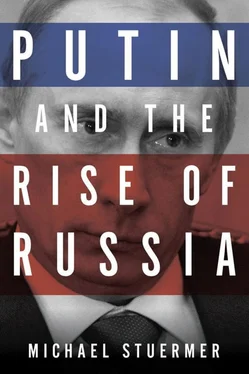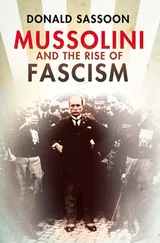The shifts in the population and the future imbalances between the old and the young, but also the rising percentage of the non-Russian population are strategic concerns of the first magnitude for the Kremlin. Russia, in the nineteenth century a land of infinite population growth, is now a land of elderly women, mostly widows, as men tend to die in their mid-fifties ‘of excessive drinking and work accidents resulting from booze’ – as Putin put it, disapprovingly. Children are a rare sight in Moscow’s busy centre but also in the suburbs. Except in Muslim areas like Tatarstan, Russia is the land of the one-child family, and of early death. What is to be done about it? Putin indicated a panoply of social improvements. ‘The solution is obvious. We are lacking, above all, a comprehensive and efficient health-care system. That can be set up administratively, but no longer through the centre, which is too far away from the real needs of the people. The regions must be made to administer health care. Therefore, the regional governors will receive the necessary budget allocations. In addition, we have targeted programmes to help young families. Economic growth will also do its part. But we have no magic wand. And as far as those twenty-five million Russians beyond our borders are concerned, we want to harmonize legislation with the other CIS countries and make the respective health-care and pension systems mutually compatible. Moreover, we do hope to transform Russia so that people queue up to come home on their own account.’
In the end, Putin put in a note of warmth and sympathy for the Americans hit by Hurricane Katrina: ‘I have talked to George [Bush] and offered all the help that we can give. What does this disaster mean? We are nothing in the eyes of nature and of God Almighty.’
Putin, inspired by his tsarist predecessors, posed as a social conservative, fearful of instability abroad and social disruption at home. In his youthful days he must have repeated, time and again, Karl Marx’s famous exhortation that it is not enough to interpret the world, but to change it. In the Kremlin there was a man keen to present a picture of himself as a pillar of world order and of Russia as a status quo power, part of an emerging world balance, trying to recover from post-imperial blues.
One year on, in September 2006, another meeting with what by now was known as the Valdai Club took place with Mr Putin as host. This time the venue was a princely dacha just outside Moscow called Novo-Ogarevo. When we had exited from the eight-lane motorway, the well-kept winding road, with a policeman standing guard at every hundred metres, passed woodlands and extensive 1930s villas as well as more modern buildings, including the stylish mansion that Mr Khodorkovsky, when CEO of Yukos, had built for himself. The billboards crowning the road at regular intervals advertised Western luxury goods that most Russians probably had never heard of. After about ten kilometres, a narrow road branched off, allowing no entry except with special permits. It ended in front of a steel gate painted white and adorned with two imperial double-headed eagles. The remote-controlled gate opened and allowed access to a park, with a wooden church in the distance, a small lake and a yellow-painted mansion in the timeless heavy neoclassical style at home in Russia since the tsars, but most probably built in the 1930s. It would have been interesting to know whose ghosts inhabited the well-kept structure. Instead, the President’s guests were ushered into an extensive dining room on the first floor. A lavish early dinner awaited them, announced on an eagle-and-gold-embossed menu card and prepared by an Italian cook.
Putin came unannounced, greeted the guests one by one with a handshake and a softly spoken word of welcome. He had come back from an African tour only a few hours before but looked as fit and energetic as ever. He gave a brief introduction, referring to the recent G8 Summit in St Petersburg where he had been in the chair, relishing the global exposure. He immediately raised the issue of energy demand and supply, and made it clear that for the foreseeable future the combination of oil, natural gas and – ‘of course’, he said – nuclear energy would be the basis for growth. Oil prices, the Middle East, Iran, the future of the nuclear non-proliferation system – all of this would develop as a function of energy. ‘We have much in common, there are overriding interests. But it takes a proactive effort.’ Energy security is the key theme: his particular theme since the days as an adult Ph.D. student at the mining institute of St Petersburg.
But the age of oil will one day draw to a close. How is Russia preparing for the time after cheap oil or, indeed, after oil? Putin offers an optimistic perspective: ‘We are working on hydrogen energy. In the medium term we will invest massively. Moreover, we shall continue to develop nuclear energy. Today sixteen per cent of our needs is covered by nuclear energy. In the next fifteen to twenty years this will rise to twenty and perhaps twenty-five per cent. Renewable energy sources like solar power are not particularly effective, not only because of our climate. A vast potential is still in hydroelectric power, although much less than China can tap. We believe in diversification.’
Is Russia aiming to be an energy superpower? And what is the meaning of energy security – the key item on the G8 agenda? Putin rejects the term superpower. It smacks of the Cold War era. But only recently his minister for energy espoused Russia’s strategic objective to be a superpower in the energy field. Putin distances himself from unwise rhetoric: ‘I have never said that Russia is or should be an energy superpower.’ He leaves it to the audience to decide what is fact and what is politically correct modesty or, perhaps, maskirovka . He mentions Russia’s vast resources in Siberia, oil for more than three decades, the most voluminous gas fields of the world. But he recognizes the risk that Russia remains caught in the role of the purveyor of raw materials. He knows about what the West calls the oil curse: the rule that riches make you lazy. The energy wealth of Siberia, he insists, will have to be used not so much for happy consumption but for the creation of a future science-based economy.
Energy, he points out, is ‘the national wealth. We have to use it in a responsible way.’ What he means is responsibility towards future generations but also, he hastens to add, towards the world community. Coming back to energy security, he points out that it has two aspects: supply and demand. ‘The West needs security of supply, Russia security of demand.’ At the G8 Russian expectations, he says, were disappointed. But sooner or later there would be consensus. In the realm of high technology Russia feels excluded, especially by the United States. France wants to sell its nuclear energy. But: ‘We want relations on the basis of equality.’ Meanwhile, Russia’s lines of development are pointing not only West but also East. The new technologies for liquefied natural gas make new markets accessible, independent of pipelines.
Where will Russia be in ten years’ time? ‘Economic power is shifting from the Atlantic to the Pacific. Growth in those parts of the world is impressive and will not soon come to an end. Russia, as a littoral state of the Pacific Ocean, enjoys natural advantages. We would like to settle each and every conflict still extant.’ That sounds like an opening to Japan? Putin prides himself for having consolidated the old uncertainty about borders with China. Why should that not serve as a model for the territorial disputes with Japan, especially over the Kuril Islands? With China, Russia has reached a state of cooperation as never before. ‘Even when in Soviet times we sang of eternal brotherly love there remained deep mistrust.’ Today there are overriding concerns, from timber production to space technology. There is also military-industrial cooperation. But energy is at the centre. Today’s 3 per cent of Russian exports go to China, Putin points out. This should rise within ten years to an ambitious – and strategic – 30 per cent. The West, in other words, will feel Chinese competition where so far the market has been almost exclusively oriented towards Western consumers. Hard times ahead, rising prices, more leverage for Russia. But it is not only natural gas that reshapes the Russo-Chinese relationship in the Far East. The first oil pipeline is under construction, bypassing Lake Baikal, soon to reach the Chinese border. The demands of the environment, he assured Western concerns, would be safeguarded. Explorations for a second, parallel pipeline had just begun in Eastern Siberia.
Читать дальше











